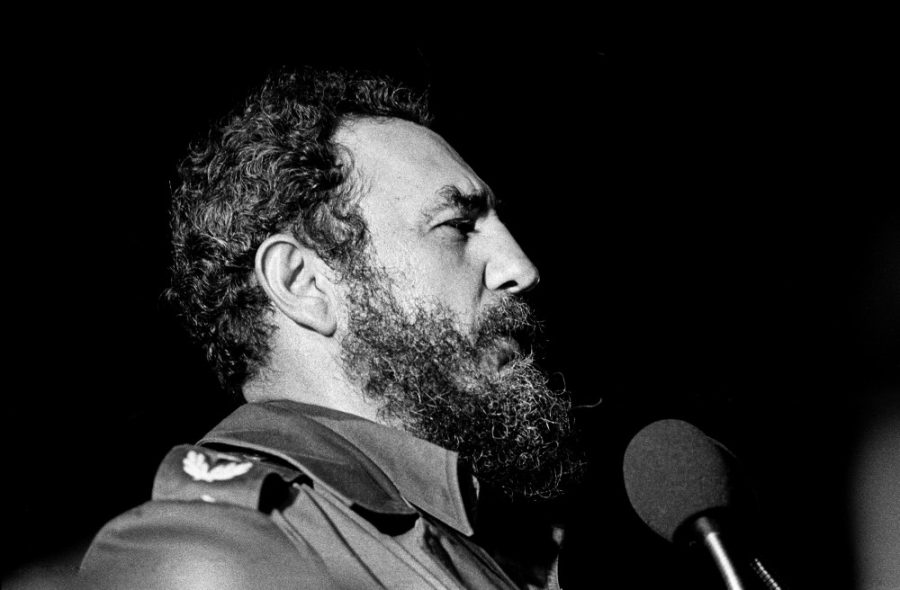Longtime Cuban dictator, Fidel Castro, died Friday Nov. 25 at the age of 90. The death of the communist dictator, who was nearly in power for 50 years, provoked a sense of relief in many Cubans, domestically and internationally, while others reacted quite to the contrary by mourning the loss of their Cuban leader. The impacts of this event have even resonated within a couple of individuals here at the UA.
*Editor’s Note: All of these interviews have been transcribed and translated from Spanish to English by the reporter.
RELATED: UA students and community react to the reality of a Trump presidency
Beatriz Urrea, UA associate professor in the Spanish and Portuguese Department, said she was born in Puerto Rico and considers herself Puerto Rican, but one who was raised with a Cuban culture at home, due to being brought up by Cuban parents.
When Urrea found out about Castro’s death over a week ago, she said she immediately thought of her mother.
“The first thing I thought of was the impact the news would have on my mother,” Urrea said. “I also thought of my father, who is no longer with us, and how he wasn’t able to live through this moment that probably would have been, if not a moment of happiness, a moment of relief for him.”
Urrea explained that many Cubans who leave their country are doing so because of the legacy Castro has instilled and left in Cuba.
“The reception of the news, for those [Cubans] that are here in the states, is connected with the loss of their homeland, with losing family ties in many cases, with losing a lifestyle and having to adapt a new way of living, and having to find a new community– a new world,” Urrea said. “So when the man responsible for so many changes, and in many cases suffering dies, it is celebrated.”
Urrea believes it is truly hard to gauge the emotional status of Cuba and its people at this time because it’s governed by such a repressive political system that doesn’t allow complete transparency in most regards.
She said there must be those in Cuba who are sad because they benefited in someway by the change of system Castro implemented on the Caribbean island, while others are happy and celebrating the death of the leader who subjected them to the conditions they have had to endure for many years.
UA Latin American politics and culture instructor, Edgard Oregiron, started off by quoting former Chinese communist leader Deng Xiaoping, who was once asked about his opinion regarding the French Revolution, “Well that happened over 200 years ago, pretty recent—more time has to pass to be able to analyze it well.”
Oregiron is utilizing the same approach and mentality Xioaping took, but applying it to the explicit effects and changes Cuba and the world will see in the future as a result of Castro’s regime.
“There have been people who have suffered, undeniably, and at the same time there have been other people, specifically in Latin America, that have seen Fidel Castro as a complete change from the violent systems present in Latin America,” Oregiron said. “Even though, Fidel Castro institutionalized his system in a violent manner.”
Oregiron recognizes there are currently two factions within the Cuban community that are fighting for the symbolic representation of what Castro will stand for. He explained that within Latin America, there is this vision of Castro that is still very much alive, depicting him as an individual of his time which was able to mobilize a grand, revolutionary political movement.
“At the same time, over here in the U.S., we have a different vision of Fidel, since we have viewed him from a different perspective and or lens,” Oregiron said.
Even though Castro is now dead, Oregiron believes he is the type of person and leader who has, and will continue to incite extreme sentiments in the people not only of America, but throughout Latin America.
“There are very few people who are neutral,” Oregiron said. “You either adore Fidel Castro, or absolutely hate him.”
UA graduate associate in the Spanish and Portuguese Department, Manuel de Jesus Rodriguez Ramos, was born in Cuba and actually lived in exile in Madrid, Spain up until 4 years ago when he was able to come to the U.S. as a Spanish citizen to complete his master’s degree at New Mexico State University.
RELATED: UA professors, students sign letter to support DACA students
“The news of the death of Fidel Castro made me feel a sense of relief, that immediately reminded me of my personal past; a constant and nostalgic reminder of all the was lost,” Ramos said.
Ramos believes that immediate changes in Cuba will not be seen since Castro has already been out of power for 10 years. However, Ramos believes that with the recent American political election and outcome, this will cause Raúl Castro to reconsider and possibly close off the country more to foreign presence and influence.
When asked if Castro’s death was symbolic, Ramos said, “I think so, and Raúl Castro wants to reinforce that nuance of symbolism with the procession of Fidel’s ashes throughout the entire island.”
If Ramos were ever granted the chance to speak with Fidel he would ask him why he betrayed the ideals he proposed in his text, “La Historia Me Absolverá,” in which he proposes the creation of an ideal country where there are no injustices and repression.
“I would ask him if at anytime he was aware and conscious of how much suffering he generated in so many people of his country,” Urrea said.
Follow Alex Gonzalez on Twitter.









